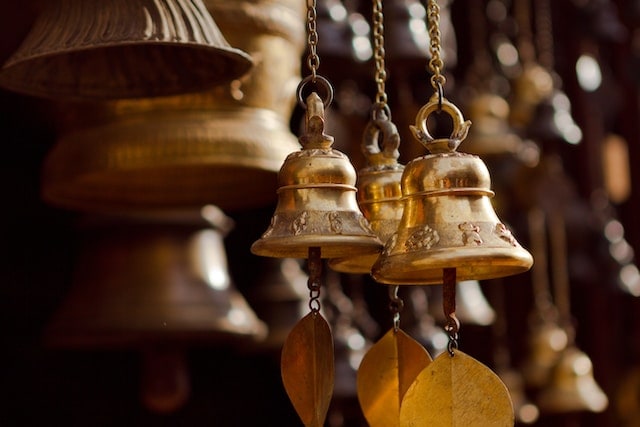
Table of Contents
Bells have been more than just time-tellers or alarms throughout history. They’ve had a special place in places like temples and towns, signaling events from celebrations to warnings. So, why have bells carried so much meaning? Let’s explore the fascinating story behind them.
Origin and History of Bells

Bells have a rich history, echoing through time and various cultures. The story begins in ancient China around 2000 BC with basic pottery bells. By 1200 BC, these evolved into bronze bells used in musical events.
Bells also held special meaning in other ancient cultures. In India, bells played a part in Hindu ceremonies, while in Rome they were believed to chase away evil spirits.
Europe took the bell’s importance even further. By AD 400, Christian monasteries across the continent used bells to signal prayer times, and they became associated with funeral ceremonies.
Bells in the Middle Ages
During the Middle Ages, bells were fixtures in town towers throughout Europe, used to announce events, mark the workday, or sound alarms. Bell-making itself became an art, seeing major advancements during this period. By the Renaissance, specialized foundries crafted bells with distinct musical notes.
While Europe was busy refining bell-making techniques, the rest of the world wasn’t left behind. Japan, for instance, incorporated bells into Buddhist rituals, while Native American tribes integrated them into their ceremonies and outfits.
Bells in the Modern World
Today, bells retain their ceremonial and religious significance in many parts of the world. However, they’re also part of everyday life – signaling school start times or warning us at train crossings. Over time, they’ve become more than just sound-makers; they’re symbols of our shared cultural, spiritual, and societal experiences.
The Symbolism of Bells

Bells hold special meanings in many cultures. Apart from their practical and ritualistic purposes, here’s what they represent.
Communication and Information
Bells have been used for centuries to send messages. Before phones or radios, people rang bells to bring everyone together, whether for a town meeting, church service, or to warn of danger. Their loud sound could be heard from far away, making them great for spreading the word quickly.
Time and Change
Bells help track time. They ring to signal hours, start or end events, and mark big moments like weddings or funerals. Their sound reminds us of life’s big changes and the moments that matter. This is especially true of church bells, such as Big Ben, which are renowned for marking the hour.
Spiritual Bonds
Many believe bells connect our world to the spiritual one. In some cultures, people ring bells to call upon gods, invite good spirits, or scare away bad ones. In Hindu culture, participants ring a bell before worshipping the deities. This is to invoke the deities, as the bell is said to produce the divine sound Om.
Joy and Positivity
Bells often ring during happy times. Whether it’s a big win for the country, like an important sports game, a town party, or a wedding, their joyful sound makes happy moments even better.
Protection from Evil Spirits
In some cultures, it’s believed that devils and demons are afraid of or annoyed by bells. They believe the ringing can keep away bad spirits or energy. Because iron was believed to keep evil entities at bay, a bell made of iron was doubly protective.
Fresh Starts
Bells can symbolize new beginnings. Their clear sound is like a fresh start, getting rid of any bad energy. Ringing a bell can mean good luck or a fresh start.
Focus and Meditation
Bells help bring attention to the now. In some meditation practices, ringing a bell brings the mind to focus on the present. This is why you’ll hear bells being rung in Buddhist monasteries, for instance. According to Mindworks, “Bells are considered a meditation enhancer, as they help practitioners keep their attention focused on the present moment”. Their sound sets religious moments apart from everyday life, reminding everyone to pay respect and be reverent.
Spiritual Meaning of Bells

Bells have been deeply intertwined with spiritual and religious practices across various cultures and civilizations. Here’s a look at the spiritual significance of bells:
1. Connecting Realms
Bells are often seen as a link between our world and the spiritual one. When a bell rings, it’s like a message being sent between the everyday and the mysterious. People have felt that the sound of a bell can reach places we can’t see or touch, like the heavens or the spiritual world.
2. Purification
Bells are like spiritual cleansers. Their sound is thought to clear away bad vibes and unwanted spirits. That’s why you might hear bells during ceremonies meant to make a place or person feel fresh and clean again.
3. Summoning and Dispelling
In many religions, ringing a bell is like sending an invite or a warning. It can call upon good forces like gods or angels. On the flip side, it can also tell bad spirits to back off.
4. Mindfulness and Meditation
For those who meditate, especially Buddhists, a bell’s ring is a gentle nudge, telling you to stay focused. It helps bring back wandering thoughts and reminds people to stay in the now.
5. A Call to Worship
Think of bells as alarm clocks for prayers or church services. Especially in Christian traditions, when you hear a bell, it’s time to gather and pray. It’s a sound that calls people together for something special.
6. Symbol of the Divine
Bells, particularly in holy places, are reminders of something bigger and grander. Their ringing makes a place feel extra special and reminds people to show respect to the higher powers they believe in.
7. Protection
Some folks wear tiny bells, like lucky charms. They hope that the sound will keep them safe from harm or bad luck. It’s a mix of tradition and belief that such a simple thing can offer protection.
8. Life’s Transitions
Bells often ring during big life moments. At funerals, their sound might mark someone’s journey to the afterlife. Meanwhile, wedding bells cheer on the start of a shared life journey.
Bell Symbolism in Religions Around the World

Bells have played a significant role in different religions across the globe, with each culture and religion assigning its own symbolic meanings to them. Here’s a look at the symbolic significance of bells in different religions:
Symbolism of Bells in Buddhism
Buddhists use bells in their ceremonies, often alongside a vajra, a ritual tool. Bells symbolize understanding and kindness. Their ring is like Buddha’s voice, asking everyone to understand the truth. They also help during meditation, signaling its start and finish.
Symbolism of Bells in Christianity
As mentioned above, bells invite Christians to church and signal prayer times. They ring at key moments during church services and during happy events like weddings or sad ones like funerals, marking life’s big moments.
Symbolism of Bells in Hinduism
In Hindu temples, ringing bells help keep away unwanted spirits and help worshippers focus. Their sound helps people concentrate on their prayers and tells the god they’re praying to that they’re there.
Symbolism of Bells in Shinto
In Japan’s Shinto shrines, worshippers ring bells using a rope. This is a way to get the attention of kami, which are spirits or gods.
Symbolism of Bells in Native American Cultures
Native Americans used bells, sometimes made of shells or metal, in special ceremonies. These ceremonies could heal, chase away bad spirits, or invite good ones. They also wore bells as protective jewelry.
Symbolism of Bells in Ancient Rome
In ancient Roman times, bells, called “tintinnabulum”, were hung in places like doorways. They believed these bells kept away bad spirits and brought good luck. The bell’s sound was like a protective bubble.
Symbolism of Bells in Taoism
In Taoism, a Chinese religious tradition, bells are part of rituals to talk to spirits. Alongside gongs and drums, they help send messages from the living to the spirit world.
What Do Dreams about Bells Mean?

Dreaming about bells can hold various meanings based on their cultural, historical, and symbolic associations. Interpretations can differ depending on the specifics of the dream and the dreamer’s personal experiences. Here’s what your dream about bells could mean:
- Awakening or Alertness: Bells often signal a need to be attentive. Dreaming of one might suggest you’re being called to recognize or address something in your waking life.
- Transitions: Given their role in marking significant life events, a bell in a dream can indicate changes or transitions, either ones you’re going through or ones about to occur.
- Communication: Bells signify announcements or calls to gather. If you dream of bells, it might mean there’s a message you need to convey or listen to.
- Spiritual Connection: Bells in many traditions denote spiritual messages or a deeper calling. Dreaming of them could reflect a spiritual journey or a desire for a more profound connection.
- Warnings: Bells can be alarms. In a dream, they might suggest caution about a situation or indicate that you feel something is amiss.
- Celebration: If the bells in your dream are joyous, they could signify upcoming celebrations, happy events, or achievements.
- Inner Feelings: A loud bell ringing might represent emotions or thoughts that demand attention. It could be your mind’s way of urging you to address certain feelings or situations.
Wrapping Up
Bells are special sounds that have various meanings in different cultures. They remind us of big life events and deeper spiritual feelings. Their sound brings people together and makes us stop and think about life’s big picture.
Related articles
Ichthys Symbolism: From Pagan Origins to Christianity
Deep Meaning and Symbolism of the Sri Yantra
Gnomes: History and Symbolism Explained
Five-Fold Symbol – Origins, Meaning and Symbolism








